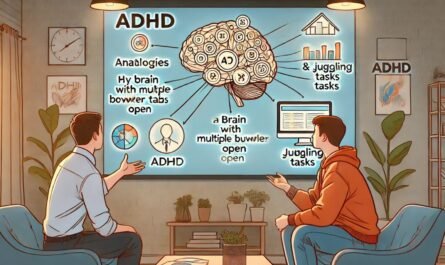Dyslexia and Obsessive-Compulsive Disorder (OCD) are two neurological conditions that affect millions of people worldwide. While they seem distinct at first glance, recent studies suggest that there might be a link between them. Understanding this connection could pave the way for more effective treatments and support for those who experience both conditions. In this article, we’ll dive deep into the relationship between dyslexia and OCD, examining the latest research, key insights, and what this means for those affected.
Check out our guide on the Best OCD Workbooks to see which might be best for you.
Key Takeaways:
- Dyslexia and OCD Defined: Dyslexia primarily affects reading and writing skills, while OCD is characterized by obsessive thoughts and compulsive behaviors.
- Potential Link: Recent studies suggest that individuals with dyslexia may be more prone to developing OCD, possibly due to overlapping brain functions or genetic factors.
- Importance of Early Diagnosis: Early detection and treatment of both conditions can significantly improve quality of life.
- Current Research and Developments: Ongoing research aims to uncover the genetic and neurological underpinnings of both disorders.
- Expert Opinions: Leading experts in neuropsychology are focusing on the comorbidity of dyslexia and OCD, offering new insights into their management.
Understanding Dyslexia and OCD: Definitions and Differences
What is Dyslexia?
Dyslexia is a learning disorder that primarily affects a person’s ability to read, write, and spell. It is not related to intelligence but involves difficulty in processing language. Symptoms can range from mild to severe, making it a lifelong challenge for many.
What is OCD?
Obsessive-Compulsive Disorder (OCD) is a mental health condition characterized by unwanted, persistent thoughts (obsessions) and repetitive behaviors (compulsions). These compulsions are often performed in an attempt to ease the anxiety caused by the obsessions.
Exploring the Link Between Dyslexia and OCD
Genetic Overlap and Brain Function
Research suggests that there may be a genetic component linking dyslexia and OCD. Both disorders involve certain brain regions, such as the frontal cortex, which plays a role in planning, decision-making, and impulse control. This overlap could explain why some individuals experience both dyslexia and OCD.
Shared Symptoms and Behaviors
In some cases, the anxiety and frustration caused by dyslexia can exacerbate OCD symptoms. For example, a person with dyslexia may develop compulsive behaviors around reading or writing tasks, driven by the fear of making mistakes or being judged.
Case Studies and Clinical Observations
Several case studies have documented instances where individuals with dyslexia also exhibit OCD symptoms. These cases highlight the importance of a comprehensive evaluation to ensure both conditions are properly diagnosed and treated.
Symptoms of Dyslexia and OCD
Understanding the symptoms of dyslexia and OCD is crucial for identifying and managing these conditions effectively. While they manifest differently, knowing what to look for can help in early detection and treatment.
Dyslexia Symptoms:
- Difficulty Reading: Trouble decoding words, slow reading speed, and difficulty understanding text.
- Spelling Issues: Frequent misspellings, often inconsistent with phonetic rules.
- Writing Challenges: Poor handwriting, difficulty organizing thoughts on paper.
- Language Processing: Problems with phonological processing, leading to challenges in understanding and using language.
- Mathematical Challenges: Difficulty with number-related tasks, often termed as dyscalculia.
OCD Symptoms:
- Obsessions: Persistent, unwanted thoughts, fears, or urges (e.g., fear of contamination, fear of harm).
- Compulsions: Repetitive behaviors or mental acts performed to reduce anxiety (e.g., handwashing, checking, counting).
- Avoidance: Avoiding situations that might trigger obsessions or compulsions.
- Perfectionism: A need for things to be “just right,” leading to excessive organizing or correcting behavior.
- Interference with Daily Life: Obsessions and compulsions that consume significant time and interfere with daily activities.
Coping Strategies and Treatment Options
Managing dyslexia and OCD requires a multifaceted approach that addresses both the psychological and practical challenges associated with these conditions. Here are some strategies and treatment options commonly recommended:
Dyslexia Treatment:
- Educational Interventions: Specialized instruction focusing on phonics, reading fluency, and comprehension. Programs like Orton-Gillingham and Lindamood-Bell are widely used.
- Assistive Technology: Tools like speech-to-text software, audiobooks, and reading apps can help individuals with dyslexia manage their symptoms.
- Accommodations: Extra time on tests, alternative assignments, and note-taking assistance in educational settings.
OCD Treatment:
- Cognitive Behavioral Therapy (CBT): Specifically, Exposure and Response Prevention (ERP) is the gold standard for treating OCD. It involves gradual exposure to feared situations while preventing the compulsive response.
- Medication: Selective Serotonin Reuptake Inhibitors (SSRIs) are commonly prescribed to help manage OCD symptoms.
- Mindfulness and Relaxation Techniques: Practices such as mindfulness meditation and deep breathing exercises can reduce anxiety and help manage compulsive urges.
Combined Approaches:
- Psychoeducation: Educating individuals and their families about both conditions can lead to better management and support.
- Support Groups: Joining groups for people with dyslexia or OCD can provide emotional support and practical advice.
Impact on Daily Life
Living with dyslexia and OCD can significantly affect daily life, from academic performance to personal relationships. Here’s how these conditions can impact different areas:
Academic and Work Challenges:
- For Dyslexia: Reading and writing tasks may take longer, leading to frustration and reduced academic performance. In the workplace, tasks that require heavy reading or written communication can be particularly challenging.
- For OCD: Obsessions and compulsions can interfere with productivity, as individuals may spend excessive time on rituals or avoidance behaviors. This can lead to missed deadlines or difficulty in completing tasks efficiently.
Social and Family Dynamics:
- Family Stress: Both conditions can place stress on family members, who may struggle to understand or accommodate the needs of their loved ones. Siblings and parents may feel frustration or concern over the challenges presented by dyslexia or OCD.
- Social Interactions: Dyslexia may cause difficulties in communication, leading to social withdrawal or anxiety in social situations. OCD can lead to social isolation as individuals may avoid social interactions that could trigger obsessions or compulsions.
Emotional Well-being:
- Anxiety and Depression: Both dyslexia and OCD are associated with higher rates of anxiety and depression. The stress of managing these conditions can lead to feelings of low self-esteem or hopelessness.
- Coping Mechanisms: Developing effective coping strategies, such as seeking therapy or using mindfulness techniques, can improve emotional well-being and quality of life.
Myths and Misconceptions
There are many myths and misconceptions about dyslexia and OCD, which can contribute to stigma and misunderstanding. Here, we debunk some of the most common myths:
Myth 1: Dyslexia is a sign of low intelligence.
- Fact: Dyslexia is unrelated to intelligence. Many individuals with dyslexia are highly intelligent and creative, with strengths in areas such as problem-solving and critical thinking.
Myth 2: OCD is just about being neat and tidy.
- Fact: While some people with OCD may have cleanliness-related compulsions, the disorder is much more complex. It involves a range of obsessions and compulsions, not all of which are related to cleanliness.
Myth 3: Children with dyslexia will outgrow it.
- Fact: Dyslexia is a lifelong condition. While early intervention can significantly improve reading and writing skills, dyslexia does not go away.
Myth 4: OCD can be cured by just “trying harder” to stop the compulsions.
- Fact: OCD is a mental health condition that requires professional treatment. Simply trying to stop compulsions without proper guidance can increase anxiety and worsen the symptoms.
Early Warning Signs in Children
Early detection of dyslexia and OCD is key to managing these conditions effectively. Here are some early warning signs to look out for in children:
Signs of Dyslexia in Children:
- Delayed Speech Development: Children with dyslexia may take longer to start speaking and may have trouble learning new words.
- Difficulty Rhyming: Struggling with rhymes or learning the alphabet could be early indicators of dyslexia.
- Trouble Following Directions: Difficulty understanding and following multi-step directions may also be a sign.
- Avoidance of Reading: A reluctance to read or being easily frustrated by reading tasks can be an early warning sign.
Signs of OCD in Children:
- Excessive Worry: Children with OCD may have excessive fears or worries, often about things that are unlikely to happen.
- Repetitive Behaviors: Engaging in repetitive behaviors, such as counting, tapping, or checking, even when it doesn’t make sense.
- Avoidance: Avoiding certain activities or places due to fears that seem irrational.
- Distress over Perfection: An overwhelming need for things to be done “just right,” leading to distress or tantrums when they are not.
Comparative Analysis: Dyslexia vs. OCD
A comparative analysis can help highlight the differences and similarities between dyslexia and OCD, offering a clearer understanding of how these conditions overlap and differ.
Prevalence:
- Dyslexia: Affects approximately 5-10% of the population, with varying degrees of severity.
- OCD: Affects about 2-3% of the population, with onset typically occurring in late childhood or early adulthood.
Diagnosis:
- Dyslexia: Diagnosed through educational and psychological assessments, often identified in early school years.
- OCD: Diagnosed through clinical interviews and observation of symptoms, usually identified in adolescence or early adulthood.
Treatment Approaches:
- Dyslexia: Focuses on educational interventions, accommodations, and assistive technology.
- OCD: Focuses on cognitive-behavioral therapy (CBT), particularly ERP, and medication when necessary.
Overlapping Symptoms:
- Anxiety: Both conditions can involve significant anxiety, although the sources and manifestations of anxiety differ.
- Compulsive Behaviors: While compulsive behaviors are a hallmark of OCD, some individuals with dyslexia may develop compulsions related to reading or writing tasks due to frustration or fear of failure.
FAQ Section
An FAQ section can address common questions and concerns about dyslexia and OCD, providing readers with quick and accessible information.
Q: Can a person have both dyslexia and OCD?
- A: Yes, it is possible for a person to have both dyslexia and OCD. Some research suggests that there may be overlapping genetic and neurological factors that contribute to the co-occurrence of these conditions.
Q: How can I tell if my child has dyslexia or just struggles with reading?
- A: Dyslexia involves more than just difficulty with reading. It also includes challenges with spelling, writing, and phonological processing. If you suspect dyslexia, it’s important to seek an evaluation from a professional.
Q: What should I do if I think my child has OCD?
- A: If you suspect your child has OCD, it’s important to consult with a mental health professional who can provide a proper diagnosis and recommend treatment options such as CBT and ERP.
Q: Are there support groups for people with dyslexia and OCD?
- A: Yes, there are many support groups and online communities for individuals with dyslexia and OCD. These groups offer emotional support, practical advice, and resources for managing these conditions.
Q: Is OCD related to other learning disabilities?
- A: OCD can co-occur with other learning disabilities, such as ADHD and dyslexia. Each condition requires its own treatment approach, but addressing all co-occurring disorders is important for effective management.
Links to Support Groups and Resources
Providing readers with links to support groups and resources can help them find the support and information they need.
Dyslexia Support Resources:
- International Dyslexia Association (IDA): Provides resources, support groups, and advocacy for individuals with dyslexia and their families.
- Dyslexia Help: A comprehensive resource from the University of Michigan with tools and strategies for managing dyslexia.
OCD Support Resources:
- International OCD Foundation (IOCDF): Offers support, education, and resources for those affected by OCD, including a directory of support groups.
- OCD-UK: A UK-based charity providing information, support, and a community for people with OCD.
Combined Resources:
- Child Mind Institute: Focuses on children’s mental health and learning disorders, offering a range of resources for parents and caregivers.
- Anxiety and Depression Association of America (ADAA): Provides information and support for anxiety disorders, including OCD, with resources on co-occurring conditions like dyslexia.
Recent Developments in Research (August 2024)
Recent studies have focused on the neurological basis of dyslexia and OCD, aiming to identify common biomarkers that could explain their comorbidity. For instance, a study published in July 2024 by the Journal of Neurodevelopmental Disorders found that certain genetic markers linked to dyslexia are also present in individuals with OCD, suggesting a shared hereditary component.
Another noteworthy development is the increasing use of neuroimaging techniques to study the brain activity of those with dyslexia and OCD. These advanced imaging methods have revealed that both conditions may involve abnormal activity in similar brain regions, offering new avenues for treatment.
Top Experts and Entities in the Field
- Dr. Susan Smalley – A leading researcher in neurodevelopmental disorders, Dr. Smalley has conducted extensive studies on the genetic links between dyslexia and OCD. Her work at UCLA’s Neuropsychiatric Institute is groundbreaking in understanding the hereditary aspects of these conditions.
- The Child Mind Institute – This organization is at the forefront of research and treatment for dyslexia and OCD in children. Their recent initiatives include developing early screening tools that can detect the risk of both disorders in young children, allowing for timely intervention.
- Dr. Tamar Chansky – An expert in treating childhood anxiety and OCD, Dr. Chansky has authored several books on the subject. Her research emphasizes the importance of addressing the emotional impact of dyslexia on OCD symptoms, offering practical strategies for managing both conditions.
Internal Links for Further Reading
- Best Books for OCD: Unlocking the Mind
- Cheating OCD: Understanding the Obsessions
- Emotional Regulation Worksheet
- Best Mental Health Books for Young Adults in 2024
- Best Books About PTSD: Top 5 Recommendations
Conclusion
The potential link between dyslexia and OCD opens new doors for understanding and treating these complex disorders. As research progresses, it’s crucial for individuals and healthcare providers to recognize the signs and symptoms of both conditions to ensure comprehensive care. Early diagnosis, tailored treatment, and ongoing support can make a significant difference in the lives of those affected by dyslexia and OCD.
About the Author
This article was written by PaulWellness, a dedicated platform for mental health resources, providing insights and information to help you navigate your wellness journey.


